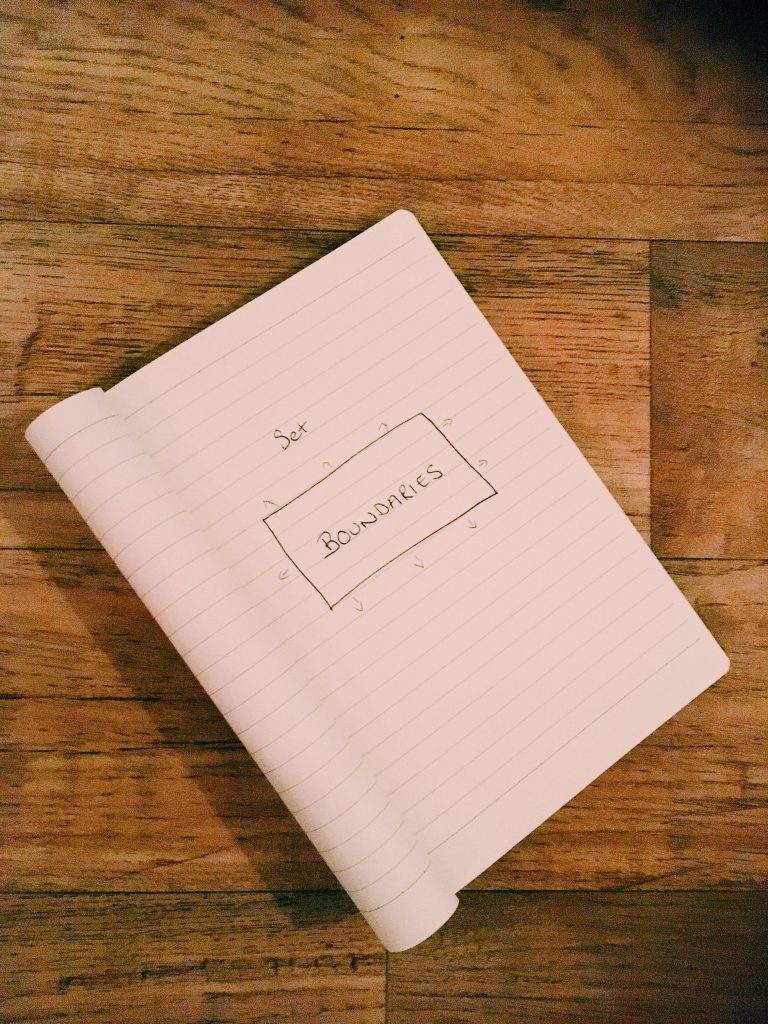Article written by Rebecca Watterson – founder of HappyIs.co.

More and more as I have got older and spent time in different workplaces and with different groups of people, I kept being given this same piece of advice:
“you need to learn to set boundaries”.
Sometimes it was direct, sometimes it was blanket advice to a group of us. I nodded politely, or agreed, but inside I was screaming:
“WHAT ARE THESE BOUNDARIES?”
I felt like I was missing something, or that I was somehow being criticized when I was just being myself. When I started to read about emotional boundaries, attempting to take this advice on board, my instinctive reaction was that they were trying to make me become someone else. I was so against it, I pushed back harder against this advice, and removed what little sense of emotional boundaries I had. By nature I am a giving person, I feel empathy very deeply, and I take on the problems and emotions of others as my own. I care about people. But what if by not having emotional boundaries I was not protecting or taking care of myself?
My lightbulb moment came about eight months ago, when I realized that by being so giving of myself to others in work and outside of it, I was jeopardizing that integrity that I clung onto so hard and was opening myself up to people who just did not have my best interests at heart. So, I decided to work on setting some emotional boundaries.
What are emotional boundaries? Why do we need them?
Emotional boundaries are your personal limits where you say this is what I find acceptable for myself, and this is what I don’t. They are crucial for our mental wellbeing, and they also demonstrate self-love and strong sense of self. They keep you safe, keep you feeling healthy and show respect for yourself.
Some signs we need them:
- You are a ‘yes’ person
Saying yes to everything because you do not know how to say no is not healthy and can impact our mental health and wellbeing massively. Not being able to say no is different to wanting to be a great friend or a supportive person. Agreeing to things constantly will end up with you feeling exhausted, mentally and physically, leading to burn out and a general unhappy feeling as you are taking on more than you can handle or indeed things you do not want to be doing.
- You give but don’t get
Being a giver is a great quality, but sometimes people take and don’t give back. This can be intentional or not, but if you find you are giving people a lot of your time and energy, and aren’t getting much back, you can feel underappreciated or taken for granted. This can impact our self-esteem and make us feel frustrated.
- You rely on others to make you feel good
Only feeling good about yourself when you get a compliment or approval from someone else can mean you don’t have any boundaries between yourself and other people when it comes to your self-worth. Your value is not based on other people’s opinions of you. By allowing others to control how you feel about yourself, you are handing over your self-worth.
How do we set them? What to do if someone violates them?
Healthy emotional boundaries are like living in a glass house. You are inside, and people can look inside, but you are firmly in control of opening doors and windows or keeping them closed. It’s your space and you decide who gets the privilege of being near you or not.
A boundary violation is when someone does something or says something to you which makes you feel uncomfortable and goes beyond the boundaries you have established. This can happen in many ways depending upon which boundary they have violated. For instance, a physical boundary violation will be different from an emotional boundary violation, and they are likely to require different actions to confront the violator
For emotional boundaries, take a step back. Remember to practice self-care and take time for yourself without guilt. You deserve to feel good and be happy. Check in with yourself when you aren’t feeling great and recognize when a boundary has been overstepped or when you have agreed to something you didn’t really want to. Stand firm in your decisions on boundaries and remember that saying no requires no other explanation. It is a long journey to being able to feel comfortable with those boundaries and not relinquish them, but with practice you can ensure they stay established.
Boundaries and mental health
By establishing emotional boundaries, we can make sure we protect our energy and ourselves, without compromising our values and our integrity. We can give and be supportive without putting ourselves and our mental health in jeopardy. Love yourself, look after yourself, and say no when you need to. It’s okay.
Author Biography
Rebecca Watterson is founder of HappyIs.co, a Belfast-based company to support people with making time for self-care in a fun and practical way that’s good for them, and for the planet. It is a holistic approach to how we can look after ourselves in a connected way. This is through events, workshops, seminars, products, one-to-one sessions, articles, blogs and more. It is all about finding your own version of happy and holding onto it in that moment. She loves to eat, travel and write about the things that matter whenever she can. For more, check out the HappyIs.co website or follow HappyIs.co on Facebook and Instagram.
